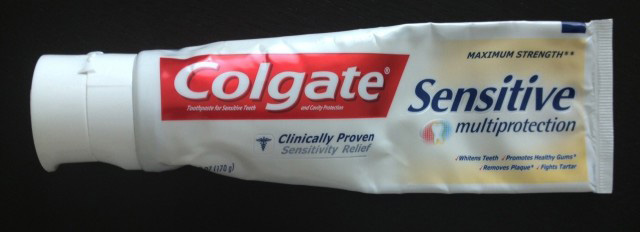Which Toothpaste Is “The Best”?

Wow. Of all the questions patients ask us, this is probably the one we hear most often. One question that we rarely hear, though, is “which toothpaste do you use?” so that is the angle at which we will approach this question.
Toothpastes appeal to us on many levels: they make our mouths feel cleaner, healthier, and they may prevent other problems before they begin. The most important factor in choosing a toothpaste is whether or not it will make you brush longer and more effectively, because it is the friction of brushing, not the particular toothpaste ingredients, that does the most good for your oral health.
With that said, the toothpaste that our contributing dental hygienist has been using for several years is Colgate Sensitive Multiprotection Toothpaste, and here’s why she says it’s “the best”:
- The flavor: A powerful mint burst. Very invigorating to the mouth, but not so much as to cause premature rinsing. Some toothpastes taste too mild to give the right amount of post-brushing freshness. This one is spot-on, and because it’s so brisk you will use less (only a pea-sized amount is needed, not the 1 inch strip as recommended on the tube).
- The texture: Paste, not gel. Simply a personal preference.
- Fluoride: All major brands of toothpaste sold in the US currently contain 0.24% sodium fluoride, and this is recommended over stannous fluoride because of its potential for causing surface stains. Fluoride is important for helping to remineralize enamel that may be weakened by dietary or bacterial acids sitting on the teeth.
- Sensitivity protection: This is critical for people whose teeth are constantly sensitive to cold temperatures. Most toothpastes that are labeled Sensitive contain 5% potassium nitrate. This ingredient acts to diffuse the nerve transmission inside teeth without leaving a fuzzy layer like some older sensitivity formulas created.
- Tartar control: The calcium deposits that build up from your saliva and plaque byproducts can be reduced by using a tartar control toothpaste. Colgate Sensitive Multiprotection contains tetrasodium pyrophosphate, which can cause skin sloughing in some people’s mouths, but if you’re looking to have less buildup on your teeth between dental visits, this is one of the few pastes that has both tartar control and sensitivity protection.
- The brand: Colgate was the first company to sell toothpaste in tubes. Not only is the brand innovative, they project an positive empowerment message to patients and dental professionals alike.
- The price: Colgate Sensitive Multiprotection is less expensive than many other sensitive-formula toothpastes and some of the stand-up tubes that can cost upwards of $6. It’s in the middle price range when compared to all toothpastes across the board.
Many toothpastes also add the words “Whitening” to their list of benefits as well. This is because of the addition of hydrated silica – a fine abrasive that will polish off surface stains. Dried out it is the stuff you see in the desiccant packages enclosed in new shoes and such that read Do Not Eat. Almost every toothpaste on the market contains hydrated silica or even diatomaceous earth, which is a natural form of hydrated silica. There are no other special ingredients added to most toothpastes for whitening, so manufacturers are free to make whitening claims on their toothpaste that will help them sell over another brand. Sometimes it’s the size of the silica particles that will make them more abrasive, so be careful to stay away from scouring toothpastes like those made for smokers.
Let us know what you think “the best” toothpaste is. If you’re getting good dental checkups then you’re probably right about your toothpaste being the best – especially for you!
